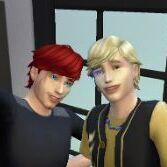-
IMPORTANT NOTE!
If you are looking for Story Titles or Author names, use Quick Search in the Stories Archive by clicking Stories or Authors on the main menu and clicking in the box at the top left. Here is link to for additional help on how to use quick search:
https://gayauthors.org/faq/authors/stories/how-do-i-use-quick-search-for-authors-and-stories-r116/
The Search bar on this page is unlikely to find the stories. You MUST use the quick search linked above.
Search the Community
Showing results for tags 'tech geek'.
-
I know there is always a new promise for finding a cure for cancer or other killing diseases, but seldom have I seen a promise to possible stop and cure both cancer and HIV. Also other diseases like Zika too. I appears this university PhD student in Canada in working with university and government labs, has possibly done that. Stopping the disease from the molecular DNA level preventing it from metastasizing and spreading. I really hope this isn't another false hope. The one thing that is heartening is the research is being done on the academic, government level and not through private industry. Conspiracy theorists might not be able to win this one
-
The more we learn about the Mayans, the more interesting everything is becoming... http://www.bbc.com/news/world-latin-america-42916261
-
It is clear that as we move forward we are getting closer and closer to the day where we hit the Star Trek level of Computer voices in our lives. How do you think things are going? I'm in a cross-functional world at the moment. I use Cortana on the PC to a limited degree. Cortana is also on Xbox One, but they've crippled her pretty severely. I see them dropping her altogether as a failure, to be honest. Google gets used more and more on the phone and Alexa rules my house. Alexa is the one I'm using most, as it ties into my Wink home automation, My Nest and my Phillips Hue gadgets. One of the developing areas is voice search and I've done some preliminary research into how that is going to affect us here on Gay Authors as well. There are big changes coming in how search engines work and it'll have an effect on us as well. They really need to settle on a standard soon so that we can start doing whatever it is we need to do. Right now, there are competing standards and methods. I suspect that it's going to be a lot more semantic markup in website coding. (Semantic search is how Google knows explicitly that something is a review or a navigation menu or that a person is an author or an editor.) Are any of you using voice controls for things yet?
-
So, I have to admit, I'm fascinated by SpaceX. And I have to say, they are really persistent. They tried recruiting me for the Mars program. I had to tell the recruiter no 3 different times. He ended up hiring away my coworker. Seriously. I wasn't interested in going to California. But damn! Very cool to see this stuff going on: http://www.telegraph.co.uk/news/2018/02/07/elon-musks-spacex-rocket-heading-towards-asteroid-belt-overshooting/
-
Photo taken by David Nadlinger, The University of Oxford Read the article for more details : http://www.abc.net.au/news/2018-02-14/atom-photo-taken-with-ordinary-camera/9445288
-
- 4
-

-

-
After a year in space, NASA finds returning twin is no longer genetically identical to the twin that remained on Earth. http://www.abc.net.au/news/2018-03-15/twins-separated-by-outer-space-no-longer-identical/9553134
-
Technology improves leaps and bounds. Often improving on tedious tasks and replacing outdated processes. Another thing that improves is accessibility with the technology. As a blind individual who is fiercely independent... this is a welcome benefit of technology. Things like Alexa help me do 99.9% of things for myself. Technology is also allowing me to interact with the world at large on a greater scale. An example of this will follow. Ford is working on a smart window that has vibrating sensors. Along with vibration, description is given to blind passenger as to what they are passing. This is amazing and a pretty ingenious use of technology. Riding in a car can be dreadfully boring for a blind individual. Let me know what you think. Feel free to add more examples you’ve seen. Ford Smart Window: https://www.engadget.com/2018/05/01/ford-smart-windows-help-blind-passengers-take-in-view/
-
Transformers live! http://www.abc.net.au/news/2018-04-26/japanese-scientists-invent-real-life-transformer-robot/9701190
-
I stumbled across this site while poking around for 3d printer information. Wowser. I subscribed. https://makezine.com/ Now, I just need time to read it. lol
-
NASA Explores an Extreme Rover for Extreme Venus-- "No Spacecraft has survived its surface heat and sulfuric Acid for more than Two Hours" 27 AUG 2017 Daily Galaxy By avoiding electronics, a NASA rover might be able to better explore Venus. The planet's hellish atmosphere creates pressures that would crush most submarines. Its average surface temperature is 864 degrees Fahrenheit (462 degrees Celsius), high enough to melt lead. A good watch can take a beating and keep on ticking. With the right parts, can a rover do the same on a planet like Venus? A concept inspired by 'steampunk' clockwork computers and World War I tanks could one day help us find out. The design is being explored at NASA's Jet Propulsion Laboratory in Pasadena, California. "When you think of something as extreme as Venus, you want to think really out there," said Evan Hilgemann, a JPL engineer working on high temperature designs for AREE. "It's an environment we don't know much about beyond what we've seen in Soviet-era images." The Automaton Rover for Extreme Environments (AREE) is funded for study by the NASA Innovative Advanced Concepts program. The program offers small grants to develop early stage technology, allowing engineers to work out their ideas. AREE was first proposed in 2015 by Jonathan Sauder, a mechatronics engineer at JPL. He was inspired by mechanical computers, which use levers and gears to make calculations rather than electronics. Mechanical computers have been used throughout history, most often as mathematical tools like adding machines. The most famous might be Charles Babbage's Difference Engine, a 19th century invention for calculating algebraic equations. The oldest known is the Antikythera mechanism, a device used by ancient Greeks to predict astronomical phenomena like eclipses. Mechanical computers were also developed as works of art. For hundreds of years, clockwork mechanisms were used to create automatons for wealthy patrons. In the 1770s, a Swiss watchmaker named Pierre Jaquet-Droz created "The Writer," an automaton that could be programmed to write any combination of letters. Sauder said these analog technologies could help where electronics typically fail. In extreme environments like the surface of Venus, most electronics will melt in high temperatures or be corroded by sulfuric acid in the atmosphere. "Venus is too inhospitable for kind of complex control systems you have on a Mars rover," Sauder said. "But with a fully mechanical rover, you might be able to survive as long as a year." Wind turbines in the center of the rover would power these computers, allowing it to flip upside down and keep running. But the planet's environment would offer plenty of challenges. No spacecraft has survived the Venusian surface for more than a couple hours. Venus' last visitors were the Soviet Venera and Vega landers. In the 1970s and 1980s, they sent back a handful of images that revealed a craggy, gas-choked world. Sauder and Hilgemann are preparing to bake mechanical prototypes, allowing them to study how thermal expansion could affect their moving parts. Some components of the Soviet landers had actually been designed with this heat expansion in mind: their parts wouldn't work properly until they were heated to Venusian temperatures. Mobility is one challenge, considering there are so many unknowns about the Venusian surface. Sauder's original idea was inspired by the "Strandbeests" created by Dutch artist Theo Jansen. These spider-like structures have spindly legs that can carry their bulk across beaches, powered solely by wind. Ultimately, they seemed too unstable for rocky terrain. Sauder started looking at World War I tank treads as an alternative. These were built to roll over trenches and craters. Another problem will be communications. Without electronics, how would you transmit science data? Current plans are inspired by another age-old technology: Morse code. An orbiting spacecraft could ping the rover using radar. The rover would have a radar target, which if shaped correctly, would act like "stealth technology in reverse," Sauder said. Stealth planes have special shapes that disperse radar signals; Sauder is exploring how to shape these targets to brightly reflect signals instead. Adding a rotating shutter in front of the radar target would allow the rover to turn the bright, reflected spot on and off, communicating much like signal lamps on Navy ships. Now in its second phase of NIAC development, the JPL team is selecting parts of the AREE concept to be refined and prototyped. Team members hope to flesh out a rover concept that will eventually be able to study the geology of Venus and perhaps drill a few samples. The Daily Galaxy via NASA/JPL
-
Tabby's Star Tabby's Star or KIC 8462852 Sky & Telescope: the Curious Case of Tabby's Star Astronomy Magazine: "Alien Megastructures" Star may be a Sign of Dying Worlds
-
Useful Links: USGS Volcano Hazards Program (CONUS) Smithsonian Global Volcanism Program USGS Latest Earthquakes (CONUS) USGS Global Earthquake Reporting Independent Earthquake Reporting (Global) Earthquake Track (Global, mapping) Earthquakes Canada (Canada) Pacific Tsunami Warning Center
-
Doing a project for my Psych course, and came across this Scientific Study: Genome-Wide Association Study of Male Sexual Orientation It's a very technical journal piece, but it does prove that Gay Men are genetically different from Heterosexual men. ____ Sanders, A. R., Beecham, G. W., Guo, S., Dawwood, K., Riegar, G., Badner, J. A., Gershon, E. S., Krishnappa, R. S., Kolundzija, A. B., Duan, J., MGS Collaberation, Gejman, P. V., Bailey, J. M., & Martin, E. R. (2017, December). Genome-Wide Association Study of Male Sexual Orientation. Scientific Reports, 7(Article Number: 16950 (2017)), . Retrieved from https://www.nature.com/articles/s41598-017-15736-4
-
Yup. https://www.msn.com/en-us/news/technology/scientists-find-planet-vulcan-from-star-trek/ar-BBNxGv9?OCID=ansmsnnews11
-
Why Is It So? was an Australian TV show that ran for over 20 years. It was one of my favourites when I was a kid. It was hosted by Professor Julius Sumner Miller and demonstrated physics in a a fun way. The ABC (Australian Broadcasting Corporation) has collated a number of the funniest and entertaining segments. https://www.abc.net.au/science/features/whyisitso/ Enjoy!
-
Prosthetic limb made from Lego by man missing an arm. If nothing else, you have to give him marks for coolness, but that latest arm looks fantastic!
-

tech geek Space Weapons and military technology of the Final Frontier
W_L posted a topic in The Lounge
Whether you are a fan of Star Trek, Star Wars, Battlestar Galactica, Babylon 5, or any number of space dramas, one thing is inescapable about our vision of space exploration: we wil need something big to shoot with. I know this can devolve into a political issue rather easily, but I want to discuss the technology aspect. Take Lasers for example, scientists have been developing theoretical designs for laser weapons since the 1980's and now we're seeing real life applications: Beyond lasers, other weapons are on the experiumental table from plasma based bolts to electromagnetic disruption technology to old fashioned rail guns There's a lot of technology to cover and a lot of innovations around the world -
The Slow Mo Guys on YouTube show off the destruction of lots of things. It is a great big time suck... https://www.youtube.com/user/theslowmoguys How Fast Does Glass Crack?
-
- 1
-

-
A set of conjoined twins who can share sensory information even though they have separate brains have led scientists to speculate that implants providing telepathic communication are feasible, as FMRI scans show the twins are only using two million neurons to communicate between their two brains. http://www.abc.net.au/news/2018-07-25/telepathic-communication-a-matter-of-time-hybrid-world-adelaide/10029312








